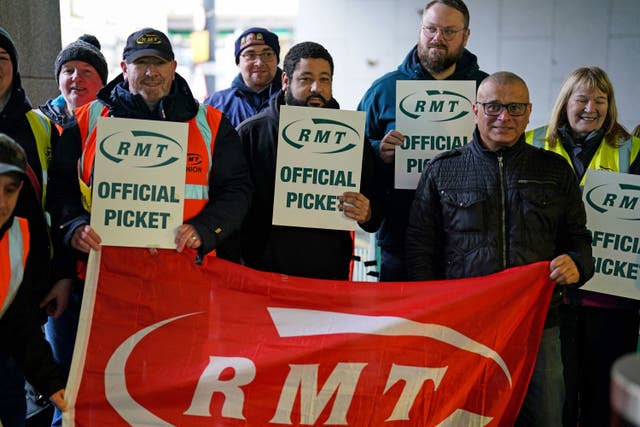
The Government’s proposed legislation on minimum service levels during strikes goes much further than its previously proposals for the transport sector, setting up another battle with trade unions.
Below, the PA new agency addresses the key questions about the extent of the new Strikes (Minimum Service Levels) Bill.
-Who sets minimum service levels?
Tuesday’s proposals give the Government the power to set minimum service levels for health, fire, education, transport, nuclear decommissioning and border security services.
The legislation does not set out what those minimum service levels should be, or what they should be based on, but gives ministers the power to impose minimums through secondary legislation, which must be approved by Parliament.
This is a change from the Government’s previous proposals, published in October, which involved employers negotiating with trade unions and, if no agreement could be reached, going through an arbitration process.
The Bill also allows minimum service levels to be imposed after a union has announced a strike.

– What is a “work notice”?
Once the minimum service level has been set, employers will be able to issue a “work notice” to their staff, which will identify the employees required to work during the strike in order to provide that minimum service levels.
They will also set out the type of work those members of staff are required to do.
Work notices must be issued at least a week before a strike begins, unless employers and trade unions agree otherwise.
When issuing a work notice, employers must not require more people to work than are “reasonably necessary” and cannot base decision about who is needed on whether they are members of a trade union or not.
-What happens if a work notice is ignored?
The penalties for ignoring a work notice could be steep, with workers facing the sack and trade unions vulnerable to being sued.
Individual workers are normally protected from being sacked if they take part in strike action, but under the new legislation they would lose that protection if they went on strike despite being identified in a work notice.
Employers would also be able to sue a trade union for some losses arising from strike action if the union failed to take “reasonable steps” to ensure that its members complied with a work notice.
This means that trade unions could be liable for losses caused by strikes, although employers would not be able to claim damages for any loss they would have suffered had union members complied with the work notice.

-Is there any role for trade unions?
Trade unions have a limited role in the process for determining minimum service levels.
When setting those levels, the Government is required to consult “such persons as the Secretary of State considers appropriate”, which is likely to include trade unions, but is not required to secure their agreement.
Downing Street said that consultation would take place while the Bill was going through Parliament.
Employers are also required to consult trade unions about the number of people and the types of work to be included in a work notice, and to “have regard” to the union’s views. But they are not required to secure the union’s agreement.
-When will the Bill become law?
The Government has said it hopes to pass the Strikes Bill before the end of the year, but the exact timetable remains uncertain.
The Bill is expected to meet significant opposition, especially in the House of Lords, which could delay its passage.
The Prime Minister’s official spokesperson said on Tuesday: “Part of it will be dependent on parliamentarians on the speed.
“We hope it can progress quickly and be introduced this year, obviously.
“And as soon as possible — I think that’s what the public want, to have this in place, so we hope that will be reflected in Parliament.”


Why are you making commenting on The National only available to subscribers?
We know there are thousands of National readers who want to debate, argue and go back and forth in the comments section of our stories. We’ve got the most informed readers in Scotland, asking each other the big questions about the future of our country.
Unfortunately, though, these important debates are being spoiled by a vocal minority of trolls who aren’t really interested in the issues, try to derail the conversations, register under fake names, and post vile abuse.
So that’s why we’ve decided to make the ability to comment only available to our paying subscribers. That way, all the trolls who post abuse on our website will have to pay if they want to join the debate – and risk a permanent ban from the account that they subscribe with.
The conversation will go back to what it should be about – people who care passionately about the issues, but disagree constructively on what we should do about them. Let’s get that debate started!
Callum Baird, Editor of The National
Comments: Our rules
We want our comments to be a lively and valuable part of our community - a place where readers can debate and engage with the most important local issues. The ability to comment on our stories is a privilege, not a right, however, and that privilege may be withdrawn if it is abused or misused.
Please report any comments that break our rules.
Read the rules here